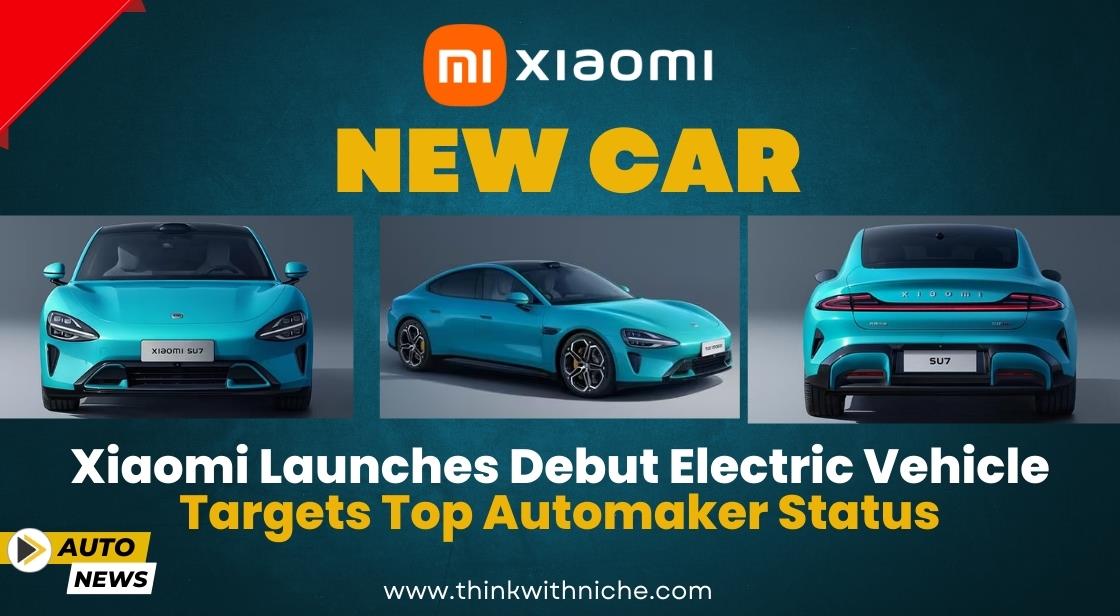Xiaomi Launches Debut Electric Vehicle, Targets Top Automaker Status

News Synopsis
Xiaomi, the renowned Chinese smartphone manufacturer, has stepped into the automotive industry by revealing its inaugural electric vehicle, the SU7. This significant move marks Xiaomi's strategic pivot towards becoming a prominent player in the highly competitive automobile market.
The SU7 Sedan Unveiling
The highly anticipated SU7 sedan, deeply integrated with Xiaomi's widely popular phone operating system, has emerged as the focal point of Xiaomi's initial electric car offering. This blending of technology aims to set the vehicle apart in a crowded market.
Xiaomi's Ambitious Vision
Despite entering a challenging automotive landscape, Xiaomi's CEO, Lei Jun, boldly articulated the company's ambitions, envisioning the creation of a "dream car" akin to top-tier brands like Porsche and Tesla. Lei Jun emphasized Xiaomi's long-term goal, aiming to secure a spot among the top five automakers globally within the next 15 to 20 years.
Xiaomi's EV Strategy
Xiaomi's venture into electric vehicles stems from its diversification efforts, a plan initially revealed in 2021. With a commitment of $10 billion earmarked for auto-related investments over a decade, Xiaomi stands among the select few tech firms venturing into China's EV market, navigating stringent regulations and market saturation.
Focus on Cutting-Edge Technology
During the Beijing launch event, CEO Lei Jun highlighted Xiaomi's commitment to advancing autonomous driving technology, positioning their vehicles at the forefront of innovation within the industry.
Production and Partnerships
Xiaomi's foray into car manufacturing involves a partnership with a unit of the state-owned BAIC Group. The collaboration will see Xiaomi-branded cars manufactured at a Beijing factory with an annual capacity of 200,000 vehicles, signifying a strategic move into production.
Some relevant and latest facts about Xiaomi's EV debut:
Market Context:
-
China's EV growth: Despite the slowdown, China's EV market remains the world's largest, growing at 100% year-on-year in 2023 (Q3).
-
Competition: Xiaomi faces established players like Tesla, BYD, and NIO, and new entrants like Huawei and Baidu.
-
Government support: Chinese government is still committed to EV development, offering subsidies and promoting charging infrastructure.
Xiaomi's SU7:
-
Specifications: Initial details are scarce, but expect competitive range, performance, and advanced features like LiDAR technology for some variants.
-
Target audience: Likely millennials and Gen Z tech-savvy consumers who value connectivity and user experience.
-
Production timeline: Mass production starts in December 2023, with initial deliveries in February 2024.
Xiaomi's broader EV ambitions:
-
Partnerships: Beyond BAIC, Xiaomi is exploring collaborations with other manufacturers and battery suppliers.
-
Software focus: The company's strength lies in software and technology, which it aims to leverage for in-car AI and autonomous driving functions.
-
Long-term vision: Xiaomi intends to build an entire ecosystem around its EVs, including charging networks and after-sales services.
Additional points:
-
Mention Xiaomi's recent successes in smartphone and AI domains to support its tech capabilities.
-
Briefly discuss potential challenges like brand recognition in the auto market and navigating the complex supply chain.
-
Include expert opinions or analyst perspectives on Xiaomi's chances of success in the EV race.









